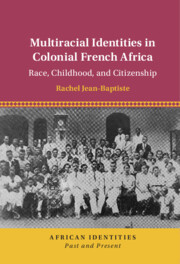Book contents
- Multiracial Identities in Colonial French Africa
- African Identities: Past and Present
- Multiracial Identities in Colonial French Africa
- Copyright page
- Contents
- Figures
- Tables
- Acknowledgments
- Introduction
- 1 Multiracial Identities and the Consolidation and Subversion of Racialized French Colonial Rule in French West Africa and French Equatorial Africa, ca. 1900–1930
- 2 Wards of the State
- 3 “I Am French”
- 4 “Odd Notions of Race”
- 5 Humanizing Maternal and Child Welfare in Dakar, 1949–1956
- 6 Multiracial Internationalism
- Epilogue
- References
- Index
5 - Humanizing Maternal and Child Welfare in Dakar, 1949–1956
Nicolas Rigonaux and the Union of Eurafricans
Published online by Cambridge University Press: 25 May 2023
- Multiracial Identities in Colonial French Africa
- African Identities: Past and Present
- Multiracial Identities in Colonial French Africa
- Copyright page
- Contents
- Figures
- Tables
- Acknowledgments
- Introduction
- 1 Multiracial Identities and the Consolidation and Subversion of Racialized French Colonial Rule in French West Africa and French Equatorial Africa, ca. 1900–1930
- 2 Wards of the State
- 3 “I Am French”
- 4 “Odd Notions of Race”
- 5 Humanizing Maternal and Child Welfare in Dakar, 1949–1956
- 6 Multiracial Internationalism
- Epilogue
- References
- Index
Summary
Chapter 5 focuses on the Union of Eurafricans in FWA, which became the Union of Eurafricans of Black Africa, and its founder Nicolas Rigonaux in the 1950s. It explores the organization’s facilitation of social, economic, and political multiracial projects, mainly in Dakar but also throughout FWA and FEA. An infrastructure of people, monetary resources, and print and radio platforms cohered métis people across French Africa. Racialized and gendered ideas and practices related to childhood, parenting, fostering, and family were key features in articulating the meanings of belonging, autonomy, and citizenship in 1950s French Africa. This basis led to an unstable French colonial power. Rigonaux forwarded himself as a father figure, guiding the well-being of métis and facilitating the French colonial state to fulfil its promise of equality. He succeeded in many of his initiatives with money from the colonial state. Changes he initiated were the direct remittance of welfare payments to African mothers, the publication of a newsletter, and founding a home for métis children in Dakar managed by a métis-owned charity.
Keywords
- Type
- Chapter
- Information
- Multiracial Identities in Colonial French AfricaRace, Childhood, and Citizenship, pp. 195 - 234Publisher: Cambridge University PressPrint publication year: 2023

